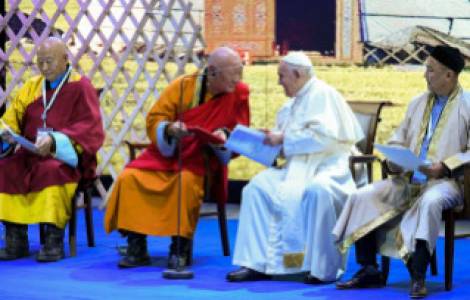
VaticanMedia
Ulaanbaatar (Agenzia Fides) - There is a "social significance of our religious traditions", which can be gauged by the extent to which we are capable of living in ‘harmony’ with other pilgrims on this earth" and ‘spread harmony’, that "special relationship born of the creative interplay of differing realties, without imposition or amalgamation, but with complete respect for their differences, in view of a serene life in common". This is what Pope Francis declared in his speech delivered this morning, Sunday, September 3, during the ecumenical and interreligious meeting which represented one of the main meetings of his brief and intense apostolic visit to Mongolia. In a hall of the hub Theater of Ulaanbaatar, the All Hun Theater in Ulaanbaatar in the shape of a ger - the ancient dwelling of the nomadic people of Central Asia with a circular shape and a central opening in the ceiling - the Pope Francis sat next to twelve local representatives of Buddhism, Hinduism, Islam, Shintoism, Shamanism, Judaism, Orthodox churches and Evangelical communities, and listened to their speeches. He then addressed them by presenting himself as "a brother in faith to those who believe in Christ, and as a brother to all of you in the name of our shared religious quest and our membership in the one human family".
The Bishop of Rome re-proposed his message under the sky of Mongolia, "so clear and blue", which "truly embraces these vast and imposing lands". And his entire speech was inspired by the historical events and traditions of this great Asian country to suggest that the authentic religious meaning expressed by the different traditions, in their "distinctiveness and diversity", can "enrich a humanity which is often led astray on its journey by the myopic pursuit of profit and material comfort ", and appears "often unable to find the right path".
The Mongolian people – recalled the Pope - can vaunt a history of coexistence between the followers of various religious traditions . The ancient imperial capital Kharakhorum "housed within its walls places of worship belonging to different creeds, thus exemplifying a commendable harmony ". Even the ger, the traditional Mongolian dwelling often mentioned by the Pope in his speeches during his days in Ulaanbaatar, in fact constitutes "a human space: familiar and welcoming", and at the same time, in its very configuration, "expresses an essential openness to the divine. This spiritual dimension is represented by its overhead opening, which admits a beam of light that makes the interior, as it were, a great sundial marking, through an interplay of light and shadow, the hours of day and night". In the ger "family life takes place" and even when there are many of us, we know how to make room for someone else. We welcome "friends, but also travelers and even strangers". An openness to hospitality which has also been experienced by "Catholic missionaries from other countries who were welcomed here as pilgrims and guests, and gently entered into this culture, bringing their humble testimony to the Gospel of Jesus Christ". In his speech, the Successor of Peter highlighted how Mongolia possesses a great patrimony of wisdom and mentions ten aspects of this patrimony found in the daily life of the Mongolian people: a healthy relationship to tradition, respect for the elders and ancestors, care for the environment, the value of silence and the interior life, and "a healthy sense of frugality"; but also "the value of hospitality; the ability to resist attachment to material objects.
As opposed to the richness and harmony that spiritual traditions are called to give together to the world - the Pope acknowledged - there is "narrowness, unilateral imposition, fundamentalism and ideological constraint" which "destroy fraternity, fuel tensions and compromise peace". Representatives of spiritual and religious traditions - recognized the Sovereign Pontiff - "especially in this period of history" are called to testify to the teachings they profess. "T here can be no mixing, then, of religious beliefs and violence, of holiness and oppression, of religious traditions and sectarianism. May the memory of past suffering", hoped the Pope hoped, referring in particular to the Buddhist communities of Mongolia "bestow the strength needed to transform dark wounds into sources of light". In the conclusion of his speech, Pope Francis confirmed that "that Catholic Church desires to follow this path, firmly convinced of the importance of ecumenical, interreligious and cultural dialogue" and "remaining in a spirit of openness and in respectful consideration of what the other religious traditions have to offer. Dialogue, in fact, is not antithetical to proclamation: it does not gloss over differences, but helps us to understand them, to preserve them in their distinctiveness and to discuss them openly for the sake of mutual enrichment. In this way, we can discover in our common humanity, blessed by heaven, the key to our journey on this earth" (GV) (Agenzia Fides, 3/9/2023)